IE 11 is not supported. For an optimal experience visit our site on another browser.
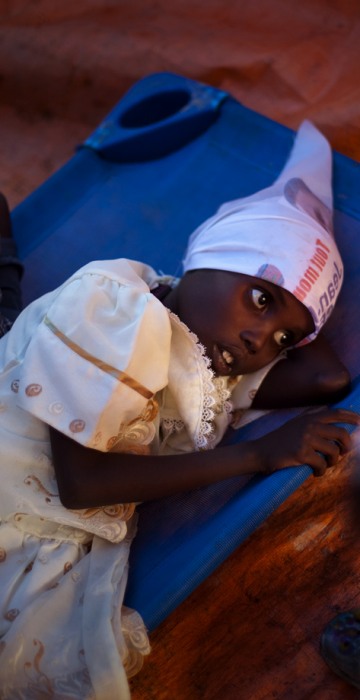
World
Cholera outbreak in Haiti
The spreading disease brings misery and riots to the country still struggling after last January's earthquake.
/ 32 PHOTOS


A resident holds packets of water to sell in downtown Port-au-Prince November 23, 2010. Aid supplies to combat Haiti's deadly cholera epidemic are flowing again into the country's northern regions after protests by Haitians blaming U.N. troops for the outbreak, humanitarian groups said on Sunday.
— Eduardo Munoz / X01440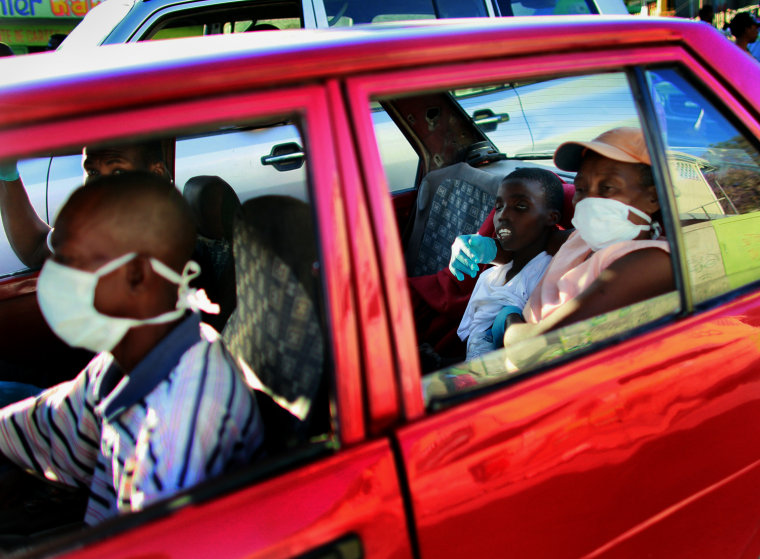
Claudy Bien-Aime, who is suffering from symptoms of cholera, is driven to a cholera treatment facility run by Doctors without Borders on November 23, 2010 in Port-au-Prince, Haiti Haiti continues to deal with a cholera epidemic that has killed at least 1,250, with thousands more sick. Doctors say it is caused by poor sanitary conditions that make the bacteria easy to transmit through contaminated water or food.
— Joe Raedle / Getty Images South America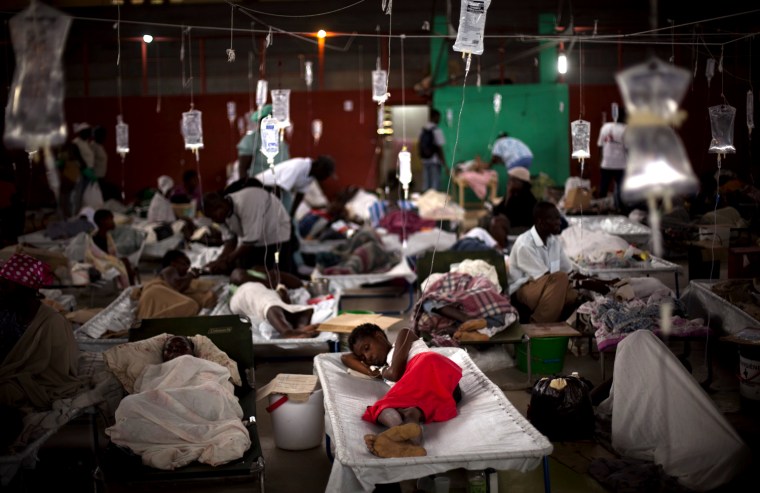
People suffering cholera symptoms are treated in a sports center converted into a cholera treatment center in Cap Haitien, Haiti, Tuesday Nov. 23, 2010. Haiti will hold elections on Nov. 28 in the midst of a month-old cholera epidemic that has killed at least 1,000 people and hospitalized thousands. (AP photo/Emilio Morenatti)
— Emilio Morenatti / AP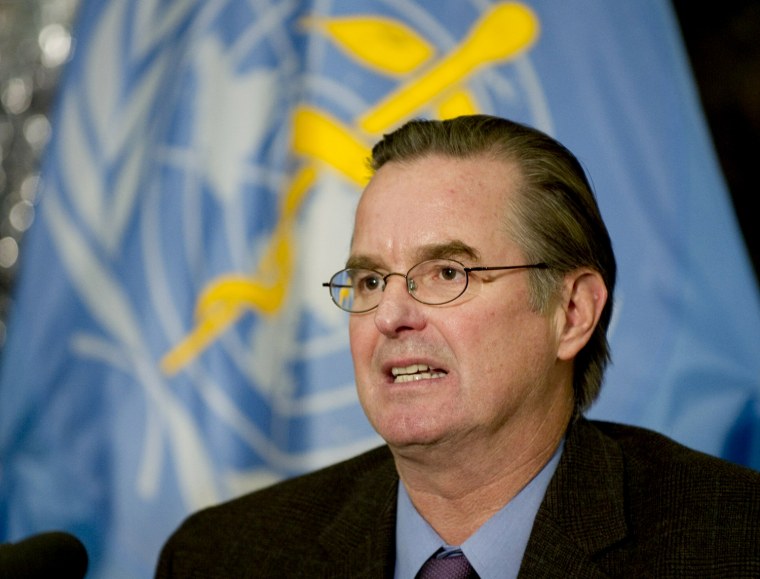
Pan American Health Organization Deputy Director Jon Andrus speaks during a press briefing on the Haitian cholera outbreak at the PAHO in Washington, DC, November 23, 2010. Deadly violence rocked the run-up to Haiti elections and protests simmered over the handling of a raging cholera outbreak, feeding fears Tuesday that the nation could slip toward broader unrest. AFP PHOTO/Jim WATSON (Photo credit should read JIM WATSON/AFP/Getty Images)
— Jim Watson / AFP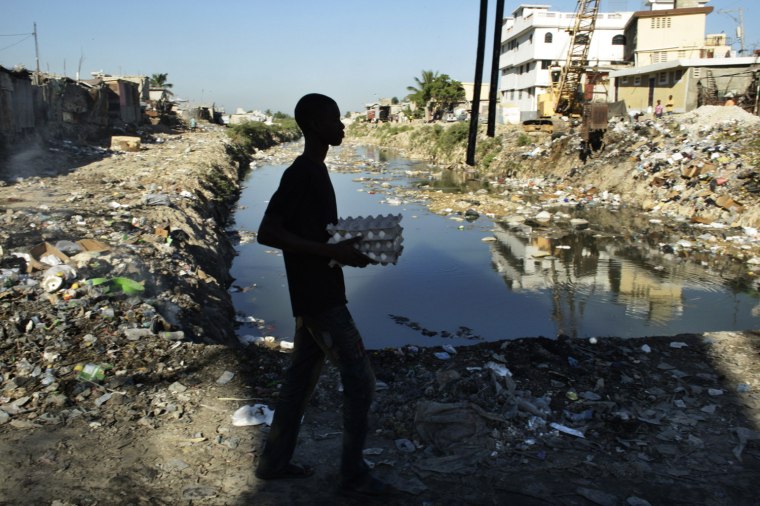
A resident carries eggs while he walks past a refuse-clogged canal in downtown Port-au-Prince November 23, 2010. Aid supplies to combat Haiti's deadly cholera epidemic are flowing again into the country's northern regions after protests by Haitians blaming U.N. troops for the outbreak, humanitarian groups said on Sunday. REUTERS/Eduardo Munoz (HAITI - Tags: HEALTH DISASTER ENVIRONMENT IMAGES OF THE DAY)
— Eduardo Munoz / X01440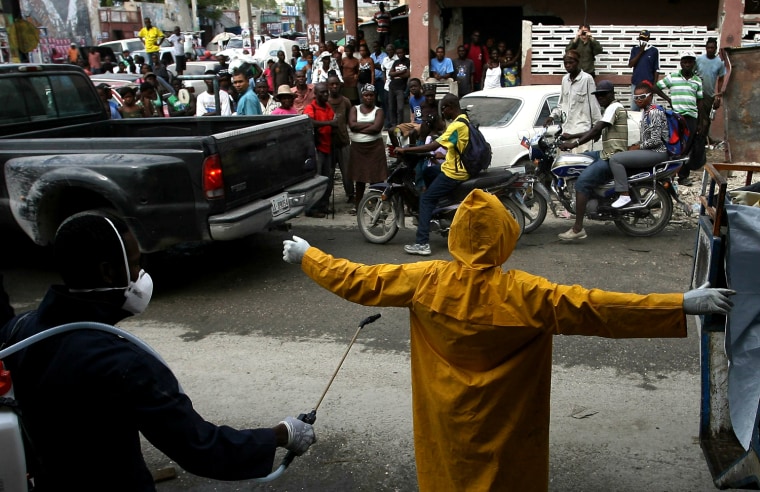
A health worker is disinfected on November 22, 2010 in Port-au-Prince. Haitian health officials said at least 1,344 people have died from a worsening cholera epidemic that has ravaged the country since mid-October. The capital city Port-au-Prince, seen as being particularly at risk of widespread infection because of the crowded and unsanitary conditions endured by tens of thousands of people sheltering in squalid, makeshift tent cities, has seen a total of 77 cholera deaths, officials said. TOPSHOTS AFP PHOTO/Hector Retamal (Photo credit should read HECTOR RETAMAL/AFP/Getty Images)
— Hector Retamal / AFP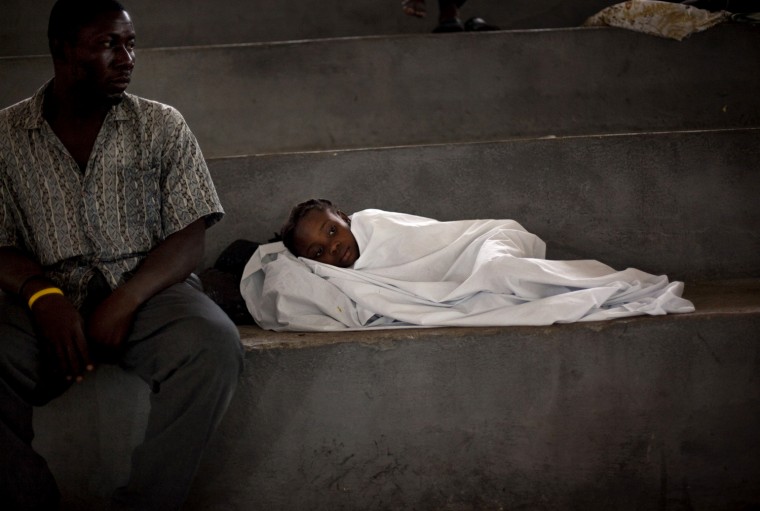
A girl suffering cholera symptoms waits for treatment at a sports center that has been converted into a cholera treatment center in Cap Haitien, Haiti, Tuesday Nov. 23, 2010. Haiti will hold elections on Nov. 28 in the midst of a month-old cholera epidemic that has killed at least 1,000 people and hospitalized thousands. (AP Photo/Emilio Morenatti)
— Emilio Morenatti / AP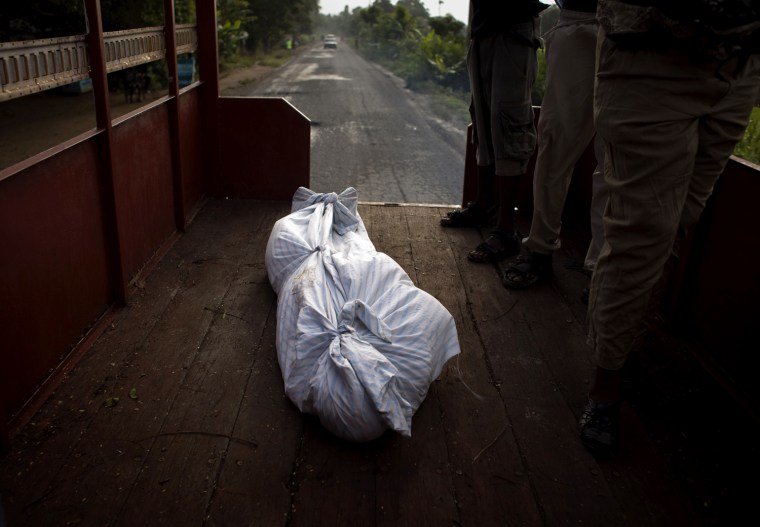
The body of Ana Luis Goerges, 75, who died of cholera, lies wrapped in a sheet as she is taken to the morgue from a local hospital in Limbe village near Cap Haitien, Haiti, Tuesday Nov. 23, 2010. Haiti will hold elections on Nov. 28 in the midst of a month-old cholera epidemic that has killed at least 1,000 people and hospitalized thousands. (AP Photo/Emilio Morenatti)
— Emilio Morenatti / AP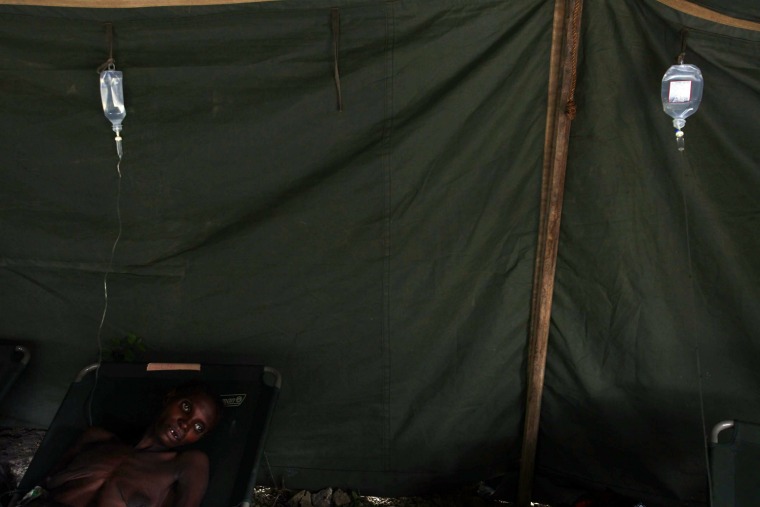
A woman suffering from cholera rests at Ste. Therese hospital in Hinche on November 20, 2010. Four Haitian presidential candidates called for a delay in elections set for November 28 as the country struggled with a cholera epidemic that has claimed nearly 1,200 lives and protests targeting UN peacekeepers. AFP PHOTO/Hector Retamal (Photo credit should read HECTOR RETAMAL/AFP/Getty Images)
— Hector Retamal / AFP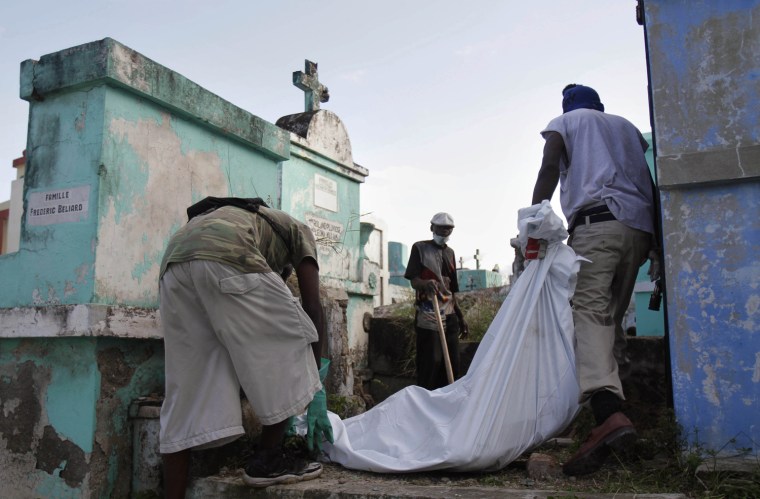
Cemetery workers dug a pit to bury the body of a victim of cholera in Cap Haitian, Haiti, Saturday, Nov. 20, 2010. Thousands of people have been hospitalized for cholera across Haiti with symptoms including serious diarrhea, vomiting and fever and at least 1,100 people have died. (AP Photo/Dieu Nalio Chery)
— Dieu Nalio Chery / AP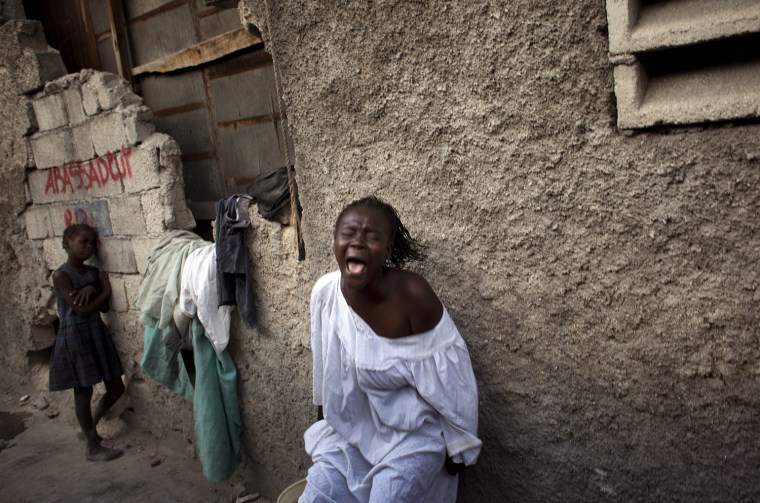
A relative of Stephanie Sanbronce, 17, who died of cholera, reacts as workers of Haiti's Health Ministry, unseen, remove her body from her house in Port-au-Prince, Haiti, Saturday, Nov. 20, 2010. Thousands of people have been hospitalized for cholera across Haiti with symptoms including serious diarrhea, vomiting and fever and hundreds have died. (AP Photo/Emilio Morenatti)
— Emilio Morenatti / AP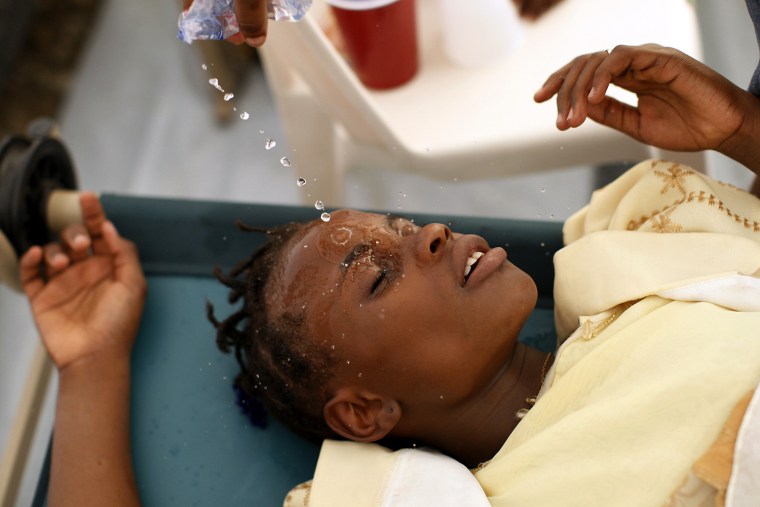
A Haitian girl with cholera symptoms is doused with water as she grimaces at an improvised clinic run by Doctor without Borders in Port-au-Prince November 20, 2010. The United Nations-led international response to Haiti's deadly cholera epidemic is \"inadequate\" and woefully short of funding, aid groups, including the U.N. humanitarian agency, said on Friday. REUTERS/ Eduardo Munoz (HAITI - Tags: HEALTH)
— Eduardo Munoz / X01440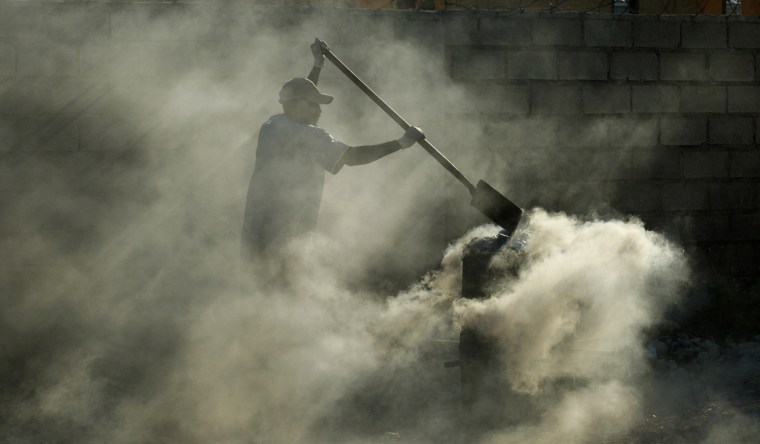
A worker from the Red Cross burns medical supplies used to control cholera next to a clinic in Port-au-Prince November 20, 2010. The United Nations-led international response to Haiti's deadly cholera epidemic is \"inadequate\" and woefully short of funding, aid groups, including the U.N. humanitarian agency, said on Friday. REUTERS/ Eduardo Munoz (HAITI - Tags: HEALTH IMAGES OF THE DAY)
— Eduardo Munoz / X01440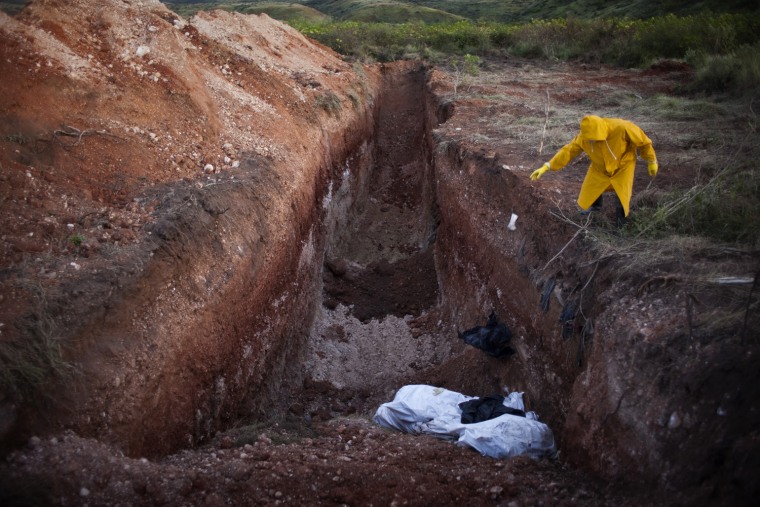
A worker of Haiti's Health Ministry throws a glove into a mass grave where bodies of victims of the cholera outbreak will be buried on the outskirts of Port-au-Prince, Haiti, Saturday, Nov. 20, 2010. Thousands of people have been hospitalized for cholera across Haiti with symptoms including serious diarrhea, vomiting and fever and hundreds have died. (AP Photo/Emilio Morenatti)
— Emilio Morenatti / AP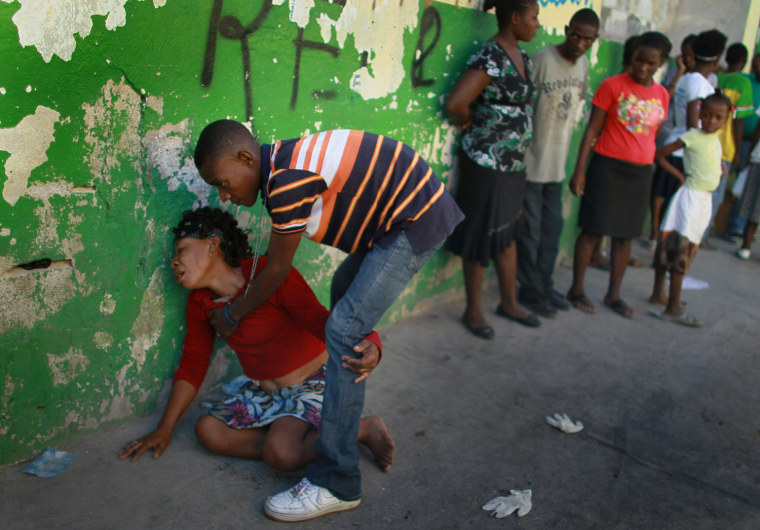
PORT-AU-PRINCE, HAITI - NOVEMBER 19: A women suffering from symptoms of cholera is helped as she sits on the ground after arriving at a health clinic in the Cite-Soli neighborhood November 19, 2010 in Port-au-Prince, Haiti. Haiti continues to deal with a cholera epidemic that has killed more than 1,100 with thousands more sick. Doctors say it is caused by poor sanitary conditions that make the bacteria easy to transmit through contaminated water or food. (Photo by Joe Raedle/Getty Images) *** BESTPIX ***
— Joe Raedle / Getty Images South America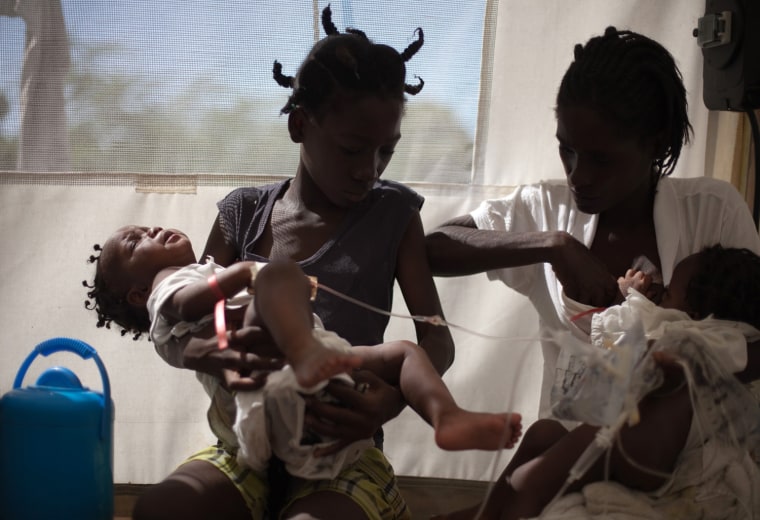
Fifteen-month-old twins with cholera are held by their mother (R) and sister as they receive IV's in the intake tent at a cholera clinic set up by Medecins sans Frontieres in the Tabarre neighborhood of Port-au-Prince, November 19, 2010. REUTERS/Allison Shelley (HAITI - Tags: DISASTER HEALTH)
— Allison Shelley / X02782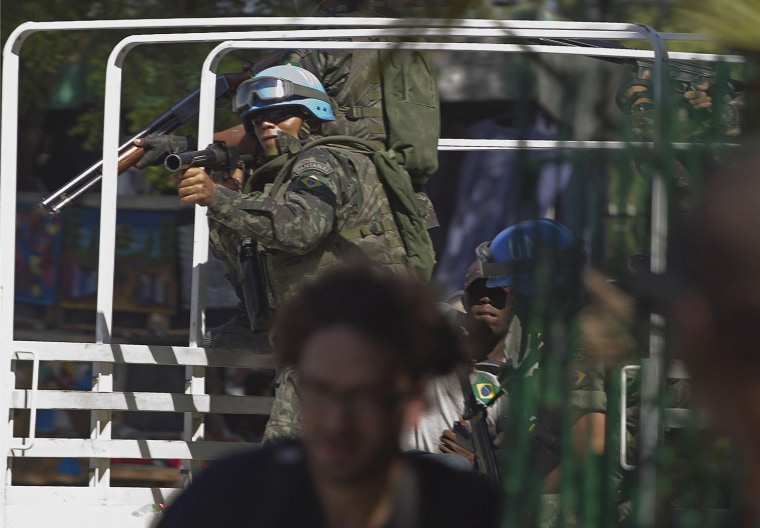
A UN peacekeeper from Brazil shoots tear gas to demonstrators during a protest in Port-au-Prince, Haiti, Thursday, Nov. 18, 2010. Following days of rioting in northern Haiti over suspicions that U.N. soldiers introduced a cholera epidemic that has killed more than 1,000 people, protesters in Haiti's capital clashed with police Thursday lashing out at U.N. peacekeepers and the government, blocking roads and attacking foreigners' vehicles. (AP Photo/Ramon Espinosa)
— Ramon Espinosa / AP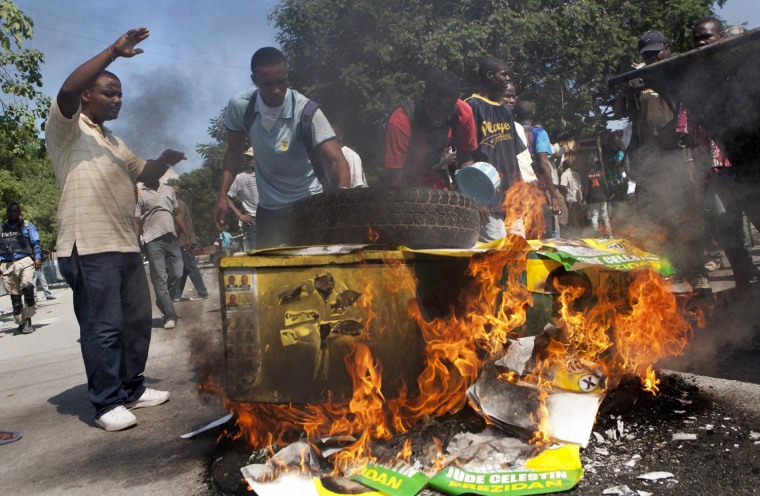
epa02454992 A group of protesters burn a political campaign banner, of the presidencial candidate, Judes Celestin, during a manifestation against the United Nations Stabilisation Mission in Haiti (MINUSTAH), near Champ Mars, in Port au Prince, Haiti., 18 November 2010. EPA/Andres Martinez Casares
— Andres Martinez Casares / EFE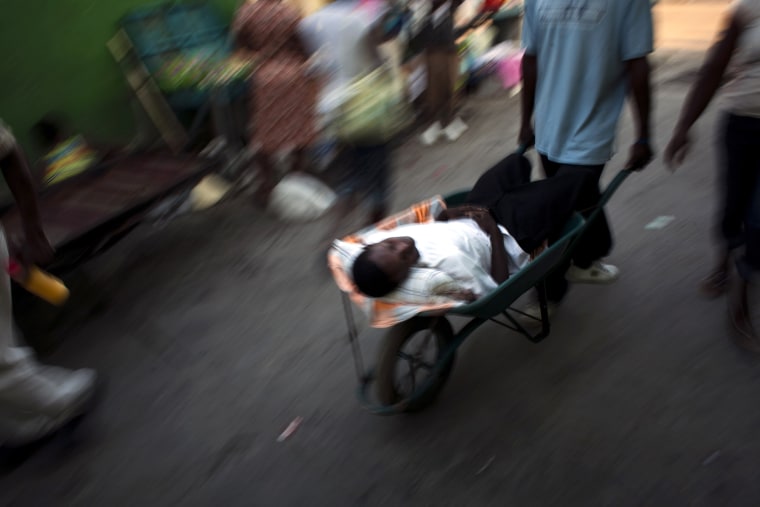
A boy suffering cholera symptoms is carried in a wheelbarrow to the St. Catherine hospital, run by Doctors Without Borders, in the slum of Cite Soleil in Port-au-Prince, Haiti, Thursday, Nov. 18, 2010. A month-old cholera epidemic has killed at least 1,000 people and hospitalized thousands.(AP Photo/Emilio Morenatti)
— Emilio Morenatti / AP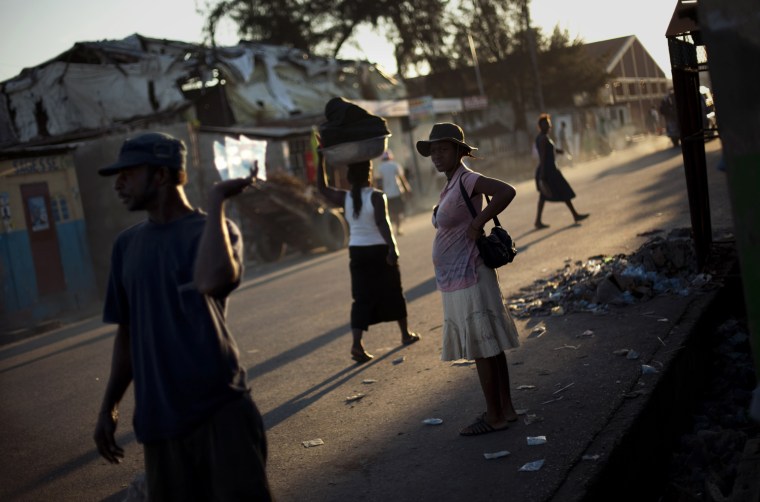
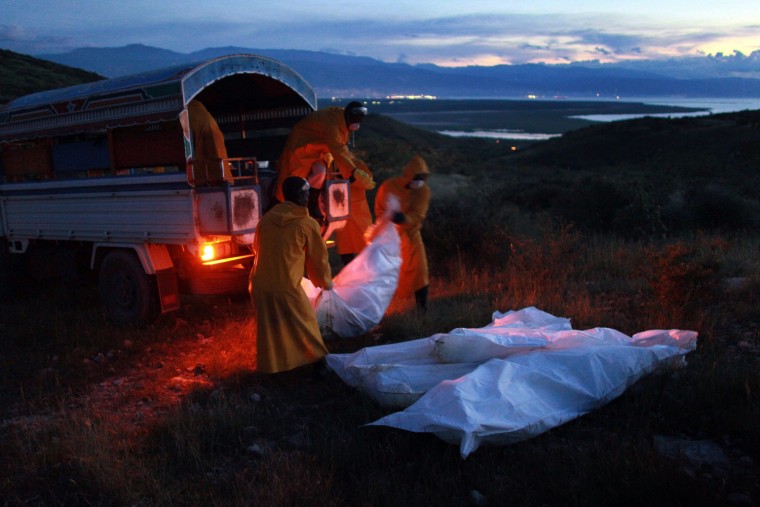
PORT-AU-PRINCE, HAITI - NOVEMBER 17: Members of a Haitian Ministry of Health body-collection team unload some of the 14 bodies as they dispose of the victims of the cholera epidemic in Titanyen, the site of a mass grave for the victims of the January earthquake, on November 17, 2010 in Port-au-Prince, Haiti. The bodies had been collected from homes, the street and a hospital as Haiti's cholera epidemic has killed more than 1,000 and sickened thousands more. Unable to find other sites to dispose of the bodies they ended up at the Titanyen site where, after negotiating with the local mayor, they were able to dump the bodies in anticipation of them being buried. Doctors say poor sanitary conditions after January's earthquake made the country vulnerable to cholera, which is caused by bacteria transmitted through contaminated water or food. (Photo by Joe Raedle/Getty Images)
— Joe Raedle / Getty Images South America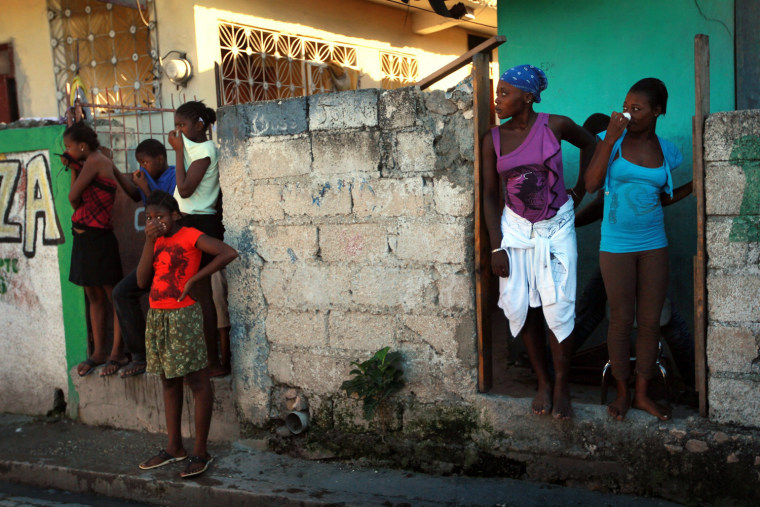
PORT-AU-PRINCE, HAITI - NOVEMBER 17: People hold their noses from the stench of dead bodies as members of a Haitian Ministry of Health body-collection team take away a victim of the cholera epidemic on November 17, 2010 in Port-au-Prince, Haiti. They collected 14 bodies from homes, the street and a hospital as Haiti's cholera epidemic has killed more than 1,000 and sickened thousands. Unable to find other sites to dispose of the bodies they ended up at the Titanyen site where, after negotiating with the local mayor, they were able to dump the bodies in anticipation of them being buried. Doctors say poor sanitary conditions after January's earthquake made the country vulnerable to cholera, which is caused by bacteria transmitted through contaminated water or food. (Photo by Joe Raedle/Getty Images)
— Joe Raedle / Getty Images South America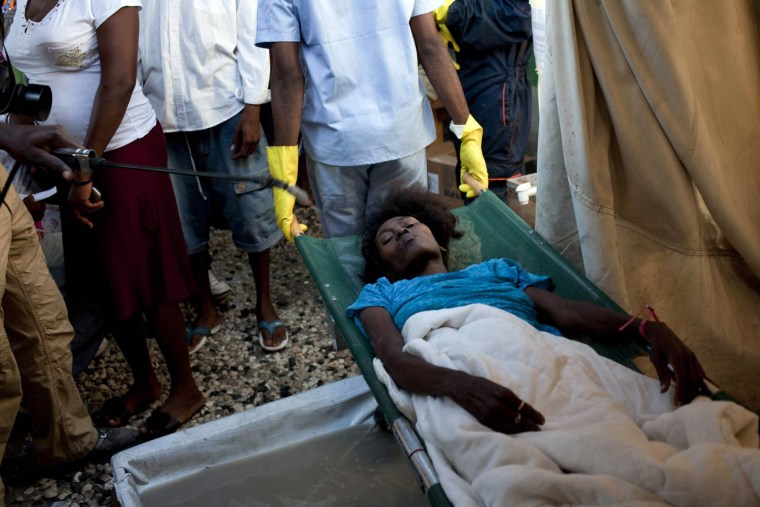
epa02451734 A woman suffering from cholera symptoms lies on a stretcher at Santa Catherine hospital, Cite Soleil district, Port-au-Prince, Haiti, 16 November 2010. Spanish Agency of International Cooperation for Development (AECID, as in Spanish) sent 14 tons of medicines to the cholera-stricken country. According to experts, the epidemic 'has turned from worrying to dramatic.' EPA/ANDRES MARTINEZ CASARES
— Andres Martinez Casares / EFE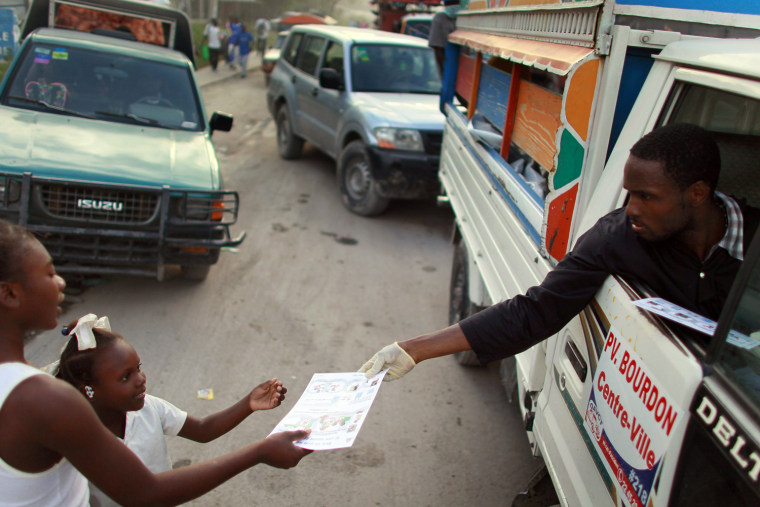
PORT-AU-PRINCE, HAITI - NOVEMBER 16: Informational pamphlets about cholera are passed out by a member of a Haitian Ministry of Health body collection team on November 16, 2010 in Port-au-Prince, Haiti. Haiti's cholera epidemic has killed more than 900 and sickened thousands. Doctors say poor sanitary conditions after January's earthquake made the country vulnerable to cholera, which is caused by bacteria transmitted through contaminated water or food. (Photo by Joe Raedle/Getty Images)
— Joe Raedle / Getty Images South America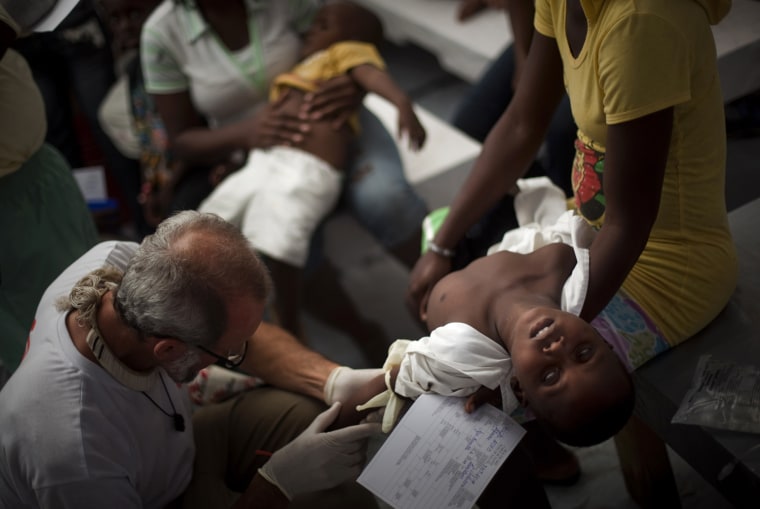
A child suffering cholera symptoms is checked by a doctor at the Doctors Without Borders temporary hospital in Port-au-Prince, Haiti, Tuesday Nov. 16, 2010. Thousands of people have been hospitalized for cholera across Haiti with symptoms including serious diarrhea, vomiting and fever and hundreds have died. (AP Photo/Emilio Morenatti)
— Emilio Morenatti / AP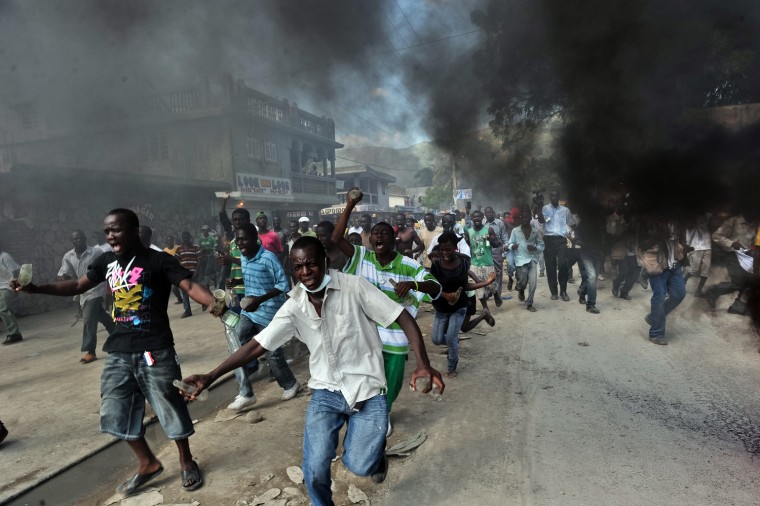
November 15, 2010, Cap Haitien, Haiti: Haitians held anti-U.N. protests, accusing Nepalese of bringing cholera to Haiti. The incidents raised security questions ahead of the general elections. In Haiti's second city of Cap-Haitien, located in the North, hundreds of protesters gathered, yelling anti-U.N. slogans and hurling stones at U.N. peacekeepers, while setting up burning barricades and torching a police station.///Haitians run through the streets as smoke from protest fires fills the air. Credit: Remi Ochlik / Bureau233 / Polaris
— Remi Ochlik / Bureau233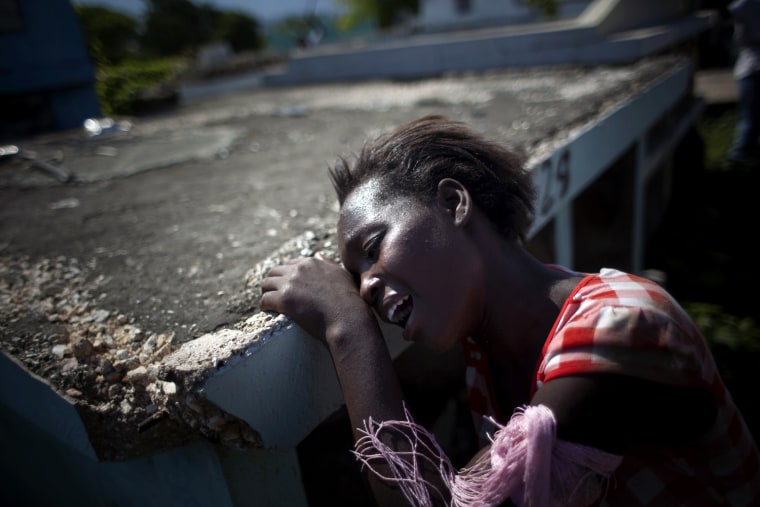
** CORRECTS SILNEY'S AGE TO 12, NOT 8 ** A relative of Monitha Silney, 12, who died of cholera, mourns during her burial at the cemetery in the slum of Cite Soleil in Port-au-Prince, Haiti, Sunday Nov. 14, 2010. Thousands of people have been hospitalized for cholera across Haiti with symptoms including serious diarrhea, vomiting and fever and hundreds have died. (AP Photo/Emilio Morenatti)
— Emilio Morenatti / AP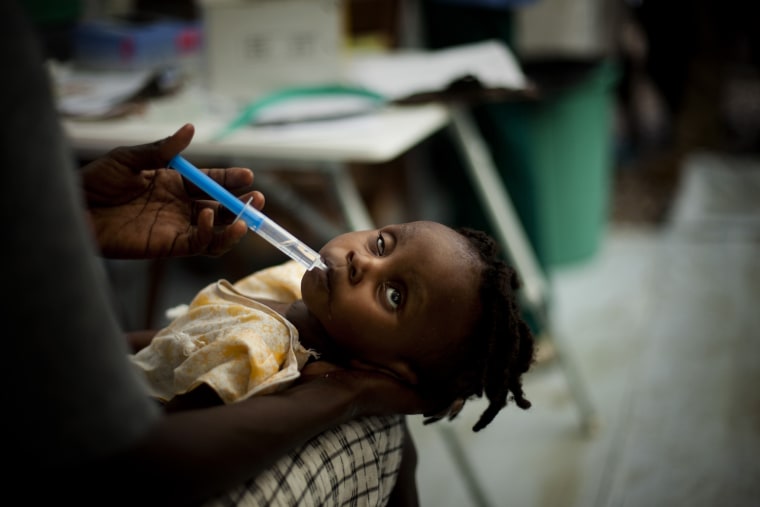
A girl suffering cholera symptoms receives treatment at the Doctors Without Borders temporary hospital in Port-au-Prince, Haiti, Friday Nov. 12, 2010. Thousands of people have been hospitalized for cholera across Haiti with symptoms including serious diarrhea, vomiting and fever and hundreds have died. (AP Photo/Emilio Morenatti)
— Emilio Morenatti / AP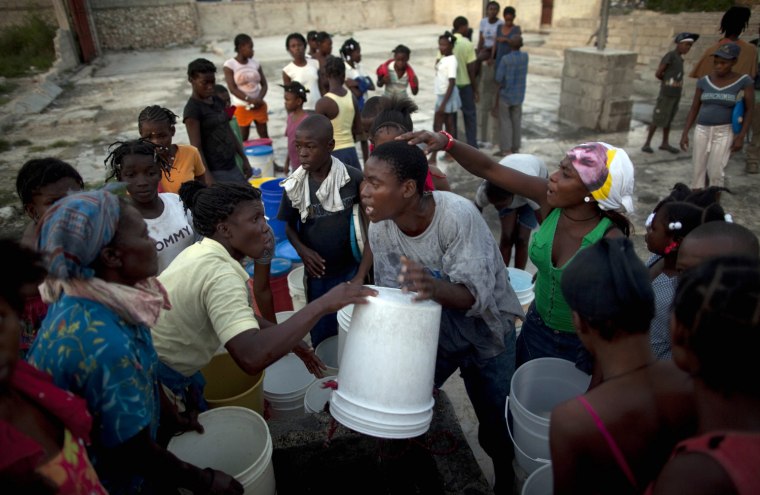
Residents argue while they wait to collect water to be used for cleaning or cooking at the Cite Soleil slum in Port-au-Prince, Haiti,Thursday, Nov. 11, 2010. Three weeks after it was confirmed for the first time ever in Haiti, cholera has claimed at least 643 lives, mostly in the countryside, as the waterborne sickness may be also growing fast in Cite Soleil and perhaps all of Port-au-Prince, a city of more than 2.5 million.(AP Photo/Ramon Espinosa)
— Ramon Espinosa / AP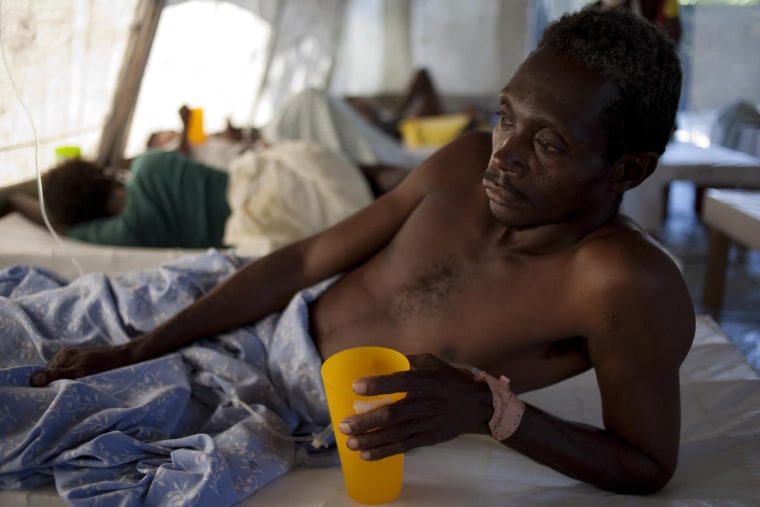
epa02442357 A man suffering from cholera recovers at the Sathe hospital in Cite Soleil, Port au Prince, Haiti, on 11 of November 2010. Media reports on 11 November 2010 state that The death toll from cholera across Haiti has risen to 644, as aid workers fight to contain the spread of the disease in the capital, Port-au-Prince. EPA/Andres Martínez Casares
— Andres Martínez Casares / EFE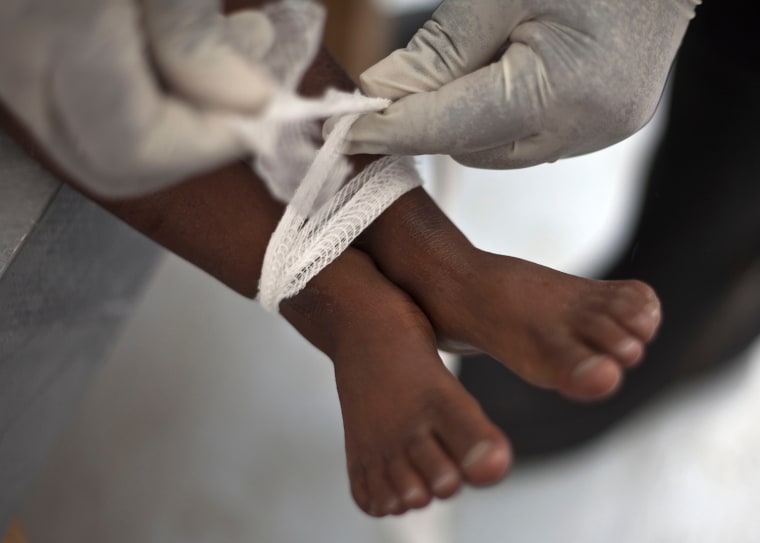
** ADDS NAME OF GIRL ** A medic ties with gauze the legs of 2-year-old Clercilia Regis who according to doctors died of cholera a few minutes earlier at the St. Catherine hospital in Cite Soleil, Port-au-Prince, Haiti, Wednesday Nov. 10, 2010. Doctors and aid groups are rushing to set up cholera treatment centers across Haiti's capital as officials warn that the disease's encroachment into the city will bring a surge in cases. Cholera has killed more than 580 people across the country according to the Haiti's health ministry. (AP Photo/Ramon Espinosa)
— Ramon Espinosa / AP1/32